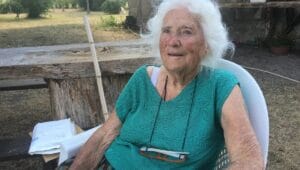Born in Paris, Callerot’s family moved to Saint-Aulaye in the French countryside to escape German shelling of Paris in World War I; she was 4, and home-schooled by her parents. In June 1940, the French government surrendered to the Nazis, with the Demarcation Line separating the German-occupied part of France happening to pass very near their house. No one was allowed to cross the line from occupied France and the Zone Libre (Free Zone), but of course many wanted to flee the German occupation.
By then Callerot was 24, and she, her father, and sister joined the French Resistance. For two years they helped people escape into Zone Libre, including Jews, children, and wounded British and American soldiers. “We didn’t look at who,” she said. “We let them cross.” Sometimes, the people were so exhausted they would need to sleep overnight to regain their strength, increasing risk. Sometimes she had to save the people from themselves. One “was Jewish and there was a price on her head. She was the wife of a doctor who was not Jewish. She arrived in red shorts and a yellow blouse. No one has ever had shorts here, and in red and yellow, you could see it from a mile away. I made her put on a dark skirt, she was furious but I stood my ground.”

One or two of the Callerots would walk them through the forest, over the line, and point them to freedom. “At the beginning, we counted,” she said. “There were more than 200, that’s for sure.” Callerot was arrested three times. The first two times she was quickly released, but the third time, in October 1942, was harder: she had been caught in the woods, a forbidden zone. After three weeks, she “reluctantly” “admitted” that she had gone to the woods to meet a man, “Jacques Martin”, who she wanted to marry. She used that name figuring it was so common, her captors would quickly give up on trying to find him. She was right, and was released.
After the war, Callerot was married, and she and her husband bought a farm just 3km from her family home. As she grew older, with her three children out of the house, she started to write. She showed a cousin, a writer, a short story she had written. He praised her work and urged her to continue. She wrote and published a novel at age 67, which sold well. She wrote four others; a fifth book, telling the story of the occupation from her point of view, was also published.
After she broke 100 years old, Yannick Lagrenaudie, mayor of Saint-Aulaye, knowing her story, put Callerot up for the Legion of Honor from the Prefect of Dordogne. That request was granted in 2018, when she was 102. “At first, I wanted to refuse,” she said. “I didn’t see why I should have the Legion of Honor. But then I thought of my parents. During the war and the Occupation, they did a lot of things. If I take it, it’s as much for them as for me.” Upon her death, President Emmanuel Macron praised the “lives she saved with anonymous heroism, and who often never knew what they owed to this [young woman].” She died at a care home in Saint-Aulaye on January 16 at 108, 100 days before she would have turned 109.
